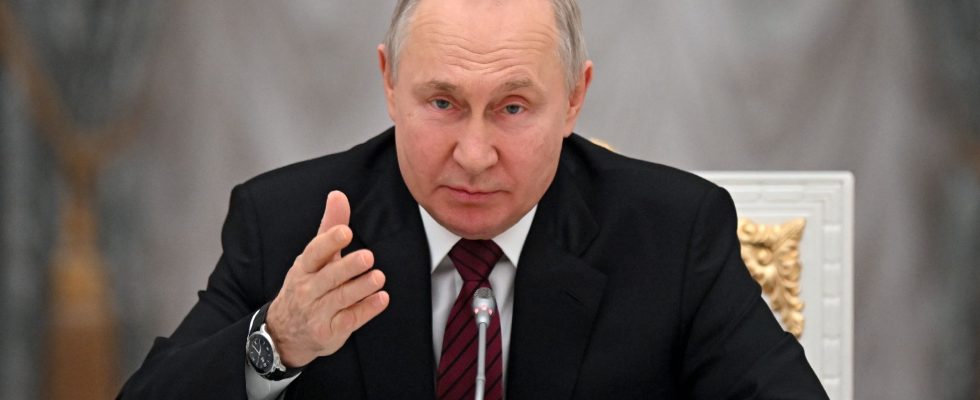Vladimir Putin assured, Friday, June 16, that the counter-offensive launched by the Ukrainian forces to repel the forces of Moscow had “no chance” of success. Referring to an ongoing Kiev offensive in southern Ukraine, the Russian president reaffirmed, during an economic forum in Saint Petersburg, that Ukraine was suffering “very heavy losses” and considered that it could not fight “for a long time” due to the depletion of his military equipment.
NATO’s allies are under pressure to replace the Western weapons destroyed on the battlefield over time and provide mass ammunition, without damaging their own defense tool. Brandishing in recent days as a trophy photos of damaged or abandoned American and German tanks, Russia claims to have destroyed 25% to 30% of Western armaments received by Ukraine. A figure undoubtedly greatly inflated, but impossible to verify independently.
The only certainty: the Ukrainian forces are suffering losses while trying to break through the enemy defense lines. According to the specialized site Oryx, which lists these losses from photos or videos taken on the battlefield, Kiev lost 4 German Leopard tanks recently delivered, 2 French AMX-10 RC FR armored reconnaissance vehicles and more than 70 combat armored vehicles. western infantry.
An African peace mediation launched
An African mission arrived in Kiev on Friday, before traveling to Saint Petersburg on Saturday, for peace mediation aimed at resolving the conflict between the two countries, even if the last-minute withdrawal of several members of the delegation darkens the chances of success.
The mission began its journey with a visit to Boutcha, the South African presidency said on Twitter by posting several videos of their trip to the city near Kiev, the scene of a massacre of hundreds of civilians blamed on the Russian army. .
Four African heads of state, a prime minister and a special envoy are due to start talks with Ukrainian President Volodymyr Zelensky, then his Russian counterpart Vladimir Putin. The South African Presidents Cyril Ramaphosa, Senegalese Macky Sall, Zambian, Hakainde Hichilema and Comorian Azali Assoumani, at the head of the African Union since February, have confirmed their participation.
As specified The world, Thursday evening, Congolese national television announced that President Denis Sassou-Nguesso, whose participation was uncertain, is ultimately not part of the trip. He is represented by his chief of staff, General Florent Ntsiba. “Degraded situation on the ground, absence of heads of state, the conditions do not seem to be in place for a peaceful and constructive dialogue”, told RFI one of Denis Sassou-Nguesso’s relatives.
However, this mediation intervenes in the midst of the Ukrainian counter-offensive with an intensification of the fighting on the ground. “In times of escalating conflict, the search for a peaceful solution must be accelerated at the same time,” Cyril Ramaphosa said in a statement on Thursday. “We want to start discussions […] to see if through joint efforts it would be possible to move closer to peace in Ukraine,” said Ukrainian Foreign Ministry spokesman Oleg Nikolenko.
Washington releases $205 million in humanitarian aid to Ukraine
The United States announced on Friday a new tranche of humanitarian aid to Ukraine in the amount of 205 million dollars to help Ukrainians cope with shortages caused by the war with Russia.
The aid must be used to provide basic necessities such as food or drinking water or in the field of education and health, according to a press release from the American Secretary of State Antony Blinken.
This aid, which will be distributed through partner NGOs in the region, should also enable the victims of the conflict to remain in contact with their families in the event of the numerous separations due to the war, the press release specifies. Since the Russian invasion of Ukraine began in February 2022, more than six million people have fled the country and more than 5 million have been internally displaced, according to figures cited by the US State Department .
Zaporizhia power plant: the “serious” but stabilized situation
The situation is “serious” but in the process of stabilization at the Ukrainian nuclear power plant in Zaporizhia after the destruction of a dam, said Thursday the director of the International Atomic Energy Agency (IAEA), Rafael Grossi.
“We can observe on the one hand that the situation is serious, the consequences are there and they are real”, explained Rafael Grossi after spending three hours at the Zaporijia power station, occupied since last year by the Russians. “At the same time, measures are being taken to stabilize the situation,” he added, without specifying what these measures were.
The visit of the head of the IAEA was notably intended to determine whether this installation had been endangered by the destruction of the Kakhovka dam on the Dnieper, the great Ukrainian river, whose water was used to cool its six reactors. Rafael Grossi, whose third trip to this place since the start of the war, said that the nuclear power plant in Zaporizhia, the largest in Europe, had “enough water”.
The plant has been the target of repeated bombings, which Moscow and Kiev blame each other for, and has been cut off from the electricity grid on several occasions, raising concerns about its safety.
